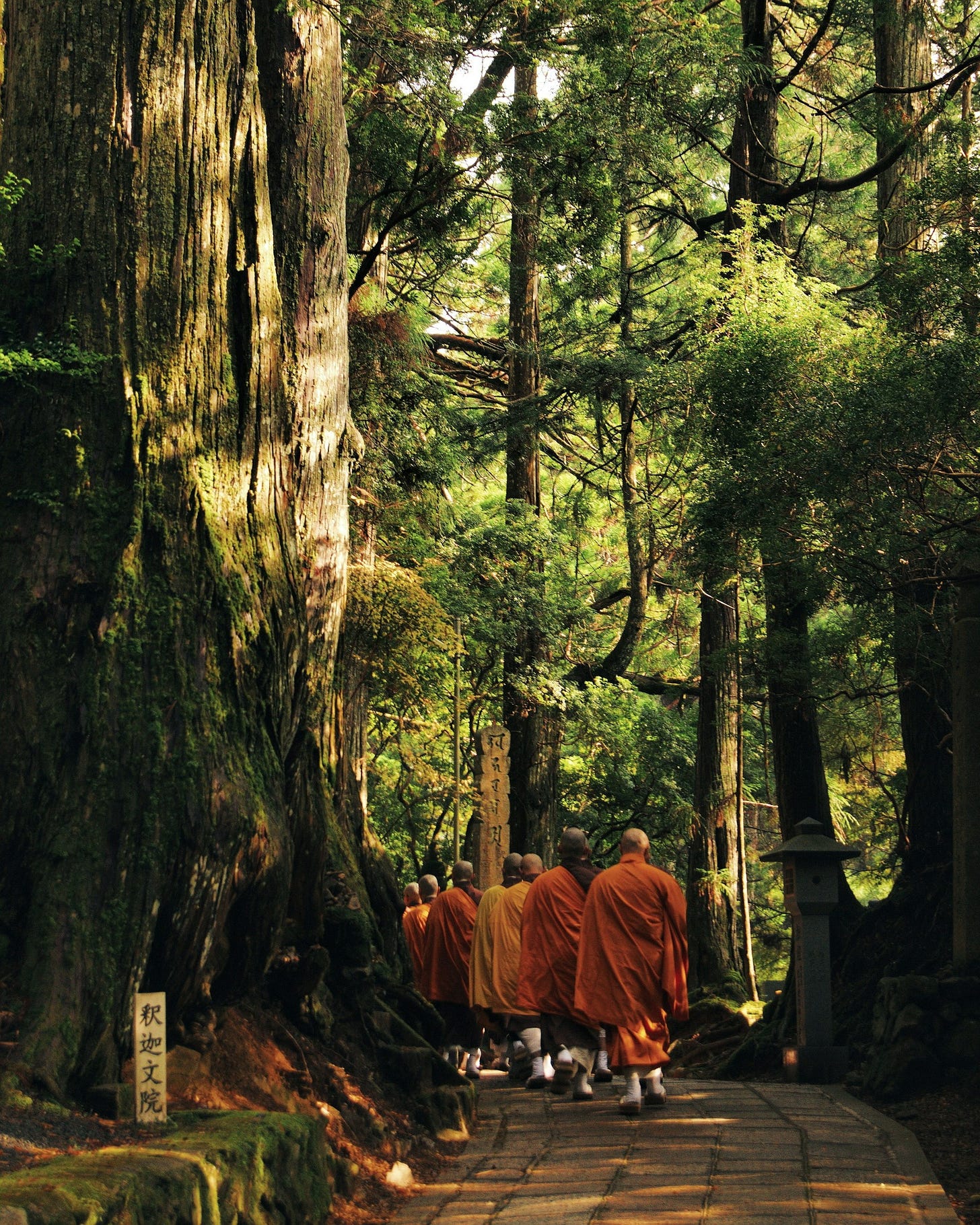Changes
Ritual in a changing world
Photo by Hanna Eberhard on Unsplash
(Orange robed monks gradually disappearing around a bend along a paved path surrounded by a forest of tall trees)
One of the debates in the Pagan and associated worlds is often about the views of (a) “being genuine” by reconstructing, as best one can, former practices, vs. (b) adapting old practices to new circumstances.
This can be complicated by people having a view that something is old when it is not.
As an example of that, “Wicca” was - publicly - largely developed by Gerald Gardner after the ban on witchcraft was overturned in the UK, and while it no doubt included at least some older practices and thinking, it was also biased by Gardner’s naturist inclinations.
And on that, in my opinion: (a) not only is disrobing in a European winter for a group ritual likely to be life threatening, (b) in a mediaeval agricultural society, disrobing, if done during the day, wastes time needed for agricultural activities which needed daylight for safety and practicality (mediaeval lighting options for a field, outside a festival bonfire, were ... not good), and at night - well, the people were known anyway, and (c) the claims made to me along the lines of arguments such knowing who people really are (in a village?), being able to blackmail others to keep them quite (just being there is enough for that), etc don’t - again, in my opinion - stack up.
In the modern era, forced nudity can be problematic for survivors of abuse, some trans people, people who are naturally quiet/private, and people who dislike being coerced - especially by comments implying that there must be something wrong with them. Fortunately, that sort of rubbish and lack of awareness (especially of trauma safe principles) seems to have largely disappeared out of naturist associated movements.
It should also be noted that there have been changes which I consider are for the better - such as dramatically reduced use of sacrifices.
To some extent, those changes - as well as some doubt over details of rituals in some cultures that did not use writing (such as Druids) - have led to the use of the (offensive, in my opinion) NeoPagan.
One of the reasons that is offensive is that what is today referred to as “christianity” underwent major changes in its early existence (some purely for the purpose of being able to get more followers - see “Gnosis “The Lost Gospels” “, by Anglican priest Pete Owen Jones, which ends with an admission that if neochristianity hadn’t gone down the particular paths it did - despite evidence that other gospels exist and women were not marginalised originally - it would not have become a widespread religion), and also experienced gaps in continuity - which are brushed over by those seeking “legitimacy” (power?).
For that reason, unless referring to people who are genuinely focused on Christ’s unqualified message of love, I refer to NeoChristianity.
But in addition to that, things can be irrelevant or of greatly reduced importance - for instance, rituals to look after the health and wellbeing of the horse(s) you use for farming and/or transport are now far less essential (which is a good thing, IMO) than a ritual to promote reliable functioning of your car - and/or a ritual to make sure you find a good mechanic, in my case. That also applies to modern medicine: a ritual to have a good doctor, or - better yet - an adequate health care system so doctors and nurses are not under time pressure is.
Those newer rituals are NOT less valid than the old. They may be based on the structure of the old, and possibly use the original ritual Deities, but they may also be different. As an example, I would consider Ptah for a ritual involving reliable cars, but not Horus - who I would consider for a ritual involving health. But there may be a completely different Deity I did not know about (and I am trying SO hard not to think of “Lady Asphalta”, the recently ... “discovered”/created being/Deity for finding car parks ... who may be a new name for an existing Deity who provided the equivalent or a similar ability for a bygone era).
In addition to that, better understanding may lead to changes.
In my opinion, the improved understanding of science and the developments of engineering are significant with regard to this aspect. Improved understanding of human psychology allows far better rituals, such as aiming to help acheive better management/”healing” of trauma rather than chasing off demons (unless the demons are metaphors for aspects of trauma); astronomy means rituals will focus on energetic effects of eclipses rather than trying to stop or reverse the eclipse (there may be better astronomical examples - I have doubts about the latter ever being attempted); better maps means rituals may focus on people’s navigation skills rather than preventing mysterious disappearances.
But in all these examples, there are constants: the principles that underlay rituals, the importance of respectful attitudes towards reality, knowing how to work respectfully with other Sentient Beings, and knowledge about the nonphysical aspects of existence.
So things change, but some things remain valid, so I consider both reconstructing and adaptation have roles in today’s world - as they likely did in times past.


